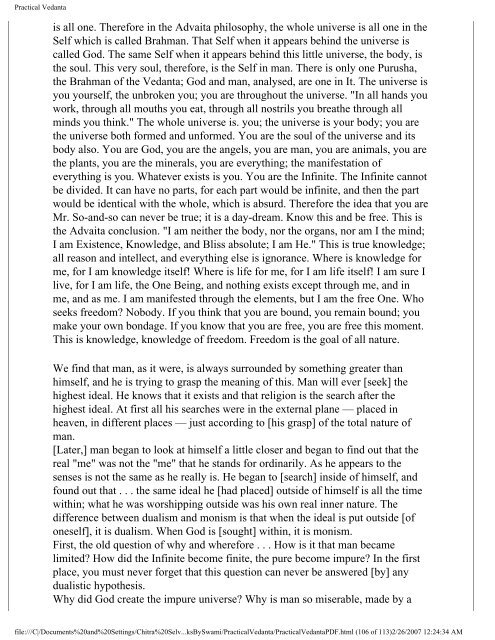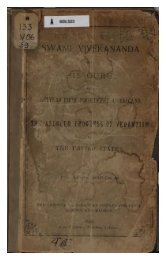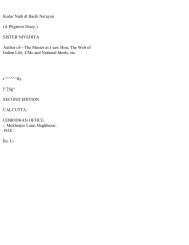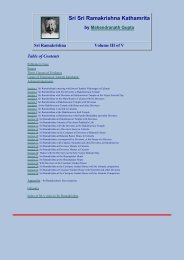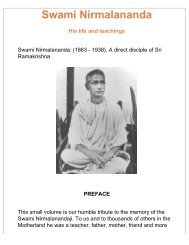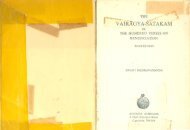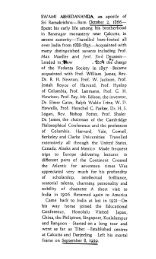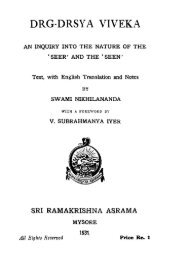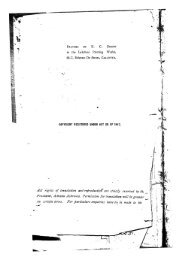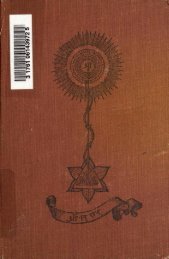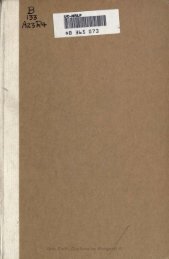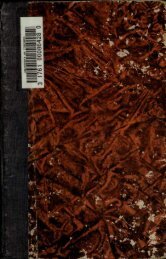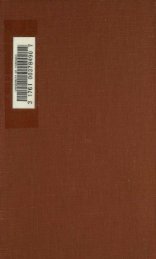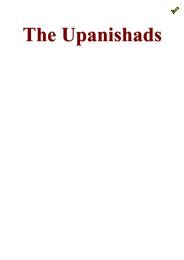Practical Vedanta
Practical Vedanta
Practical Vedanta
- No tags were found...
You also want an ePaper? Increase the reach of your titles
YUMPU automatically turns print PDFs into web optimized ePapers that Google loves.
<strong>Practical</strong> <strong>Vedanta</strong>is all one. Therefore in the Advaita philosophy, the whole universe is all one in theSelf which is called Brahman. That Self when it appears behind the universe iscalled God. The same Self when it appears behind this little universe, the body, isthe soul. This very soul, therefore, is the Self in man. There is only one Purusha,the Brahman of the <strong>Vedanta</strong>; God and man, analysed, are one in It. The universe isyou yourself, the unbroken you; you are throughout the universe. "In all hands youwork, through all mouths you eat, through all nostrils you breathe through allminds you think." The whole universe is. you; the universe is your body; you arethe universe both formed and unformed. You are the soul of the universe and itsbody also. You are God, you are the angels, you are man, you are animals, you arethe plants, you are the minerals, you are everything; the manifestation ofeverything is you. Whatever exists is you. You are the Infinite. The Infinite cannotbe divided. It can have no parts, for each part would be infinite, and then the partwould be identical with the whole, which is absurd. Therefore the idea that you areMr. So-and-so can never be true; it is a day-dream. Know this and be free. This isthe Advaita conclusion. "I am neither the body, nor the organs, nor am I the mind;I am Existence, Knowledge, and Bliss absolute; I am He." This is true knowledge;all reason and intellect, and everything else is ignorance. Where is knowledge forme, for I am knowledge itself! Where is life for me, for I am life itself! I am sure Ilive, for I am life, the One Being, and nothing exists except through me, and inme, and as me. I am manifested through the elements, but I am the free One. Whoseeks freedom? Nobody. If you think that you are bound, you remain bound; youmake your own bondage. If you know that you are free, you are free this moment.This is knowledge, knowledge of freedom. Freedom is the goal of all nature.We find that man, as it were, is always surrounded by something greater thanhimself, and he is trying to grasp the meaning of this. Man will ever [seek] thehighest ideal. He knows that it exists and that religion is the search after thehighest ideal. At first all his searches were in the external plane — placed inheaven, in different places — just according to [his grasp] of the total nature ofman.[Later,] man began to look at himself a little closer and began to find out that thereal "me" was not the "me" that he stands for ordinarily. As he appears to thesenses is not the same as he really is. He began to [search] inside of himself, andfound out that . . . the same ideal he [had placed] outside of himself is all the timewithin; what he was worshipping outside was his own real inner nature. Thedifference between dualism and monism is that when the ideal is put outside [ofoneself], it is dualism. When God is [sought] within, it is monism.First, the old question of why and wherefore . . . How is it that man becamelimited? How did the Infinite become finite, the pure become impure? In the firstplace, you must never forget that this question can never be answered [by] anydualistic hypothesis.Why did God create the impure universe? Why is man so miserable, made by afile:///C|/Documents%20and%20Settings/Chitra%20Selv...ksBySwami/<strong>Practical</strong><strong>Vedanta</strong>/<strong>Practical</strong><strong>Vedanta</strong>PDF.html (106 of 113)2/26/2007 12:24:34 AM


